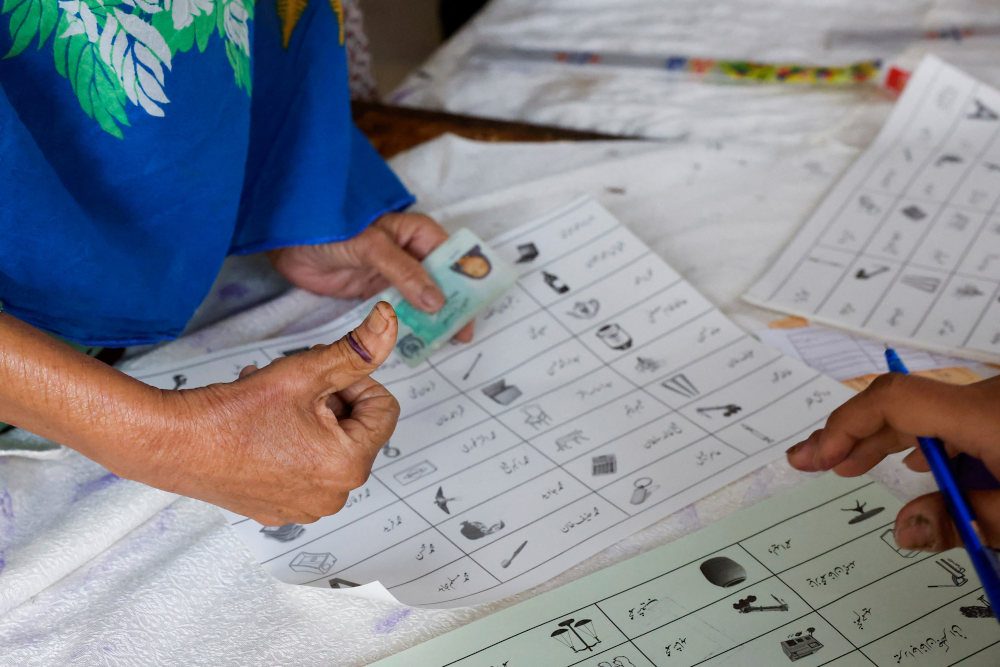SUMMARY
This is AI generated summarization, which may have errors. For context, always refer to the full article.

ISLAMABAD, Pakistan – Pakistan temporarily suspended mobile phone services across the country on Thursday, February 8, and closed some land borders to maintain law and order as voting began in a national election that has been preceded by a surge in militant violence.
In the most recent such incidents, 26 people were killed in two explosions near electoral candidates’ offices in the southwestern province of Balochistan on Wednesday. Islamic State later claimed responsibility.
The election is also being held in the midst of a deep economic crisis and in a highly polarized political environment, and many analysts believe no clear winner may emerge.
Thousands of troops have been deployed at polling stations across the country and borders with Iran and Afghanistan were temporarily closed to facilitate a peaceful election.
“As a result of the recent incidents of terrorism in the country precious lives have been lost, security measures are essential to maintain the law and order situation and deal with possible threats,” the interior ministry said in a message on X.
The move to suspend mobile networks sparked criticism from leaders of opposition parties, with the Pakistan Peoples Party’s Bilawal Bhutto Zardari, the 35-year-old son of former premier Benazir Bhutto, calling for its “immediate restoration”.
“(I) have asked my party to approach both ECP (Election Commission of Pakistan) and the courts for this purpose,” he posted on messaging platform X.
Chief Election Commissioner Sikandar Sultan Raja said the decision on mobile networks was made by “law and order agencies” following Wednesday’s violence and the commission would not interfere in the matter.
Jailed former Prime Minister Imran Khan’s Pakistan Tehreek-e-Insaf (PTI) party, in a post on X, called on people to remove passwords from their personal Wifi accounts “so anyone in the vicinity can have access to internet on this extremely important day”.
Some voters also expressed anger at the move to suspend mobile services.
“Due to this, the communication with voters and others are very difficult… we are facing so many problems due to the internet closure,” said 50-year-old Mehmood Chaudry, a school teacher who cast his vote in the city of Rawalpindi.
Despite tightened security, one person was killed when gunmen opened fire on a security forces vehicle in the northwestern area of Tank, a source in the intelligence services said.
There was no immediate confirmation from security forces.
Grenade attacks were also reported in different parts of Balochistan’s Kech district but polling remained unaffected since there were no casualties, Saeed Ahmed Umrani, commissioner of the Makran division, told Reuters.
The network suspension also follows Imran Khan’s call to his supporters, who had clashed with security forces while protesting his arrest last year, to wait outside polling booths until results are announced.
Khan cast his vote via postal ballot from a prison in Rawalpindi on Thursday morning, his party’s media team told Reuters.
Sharif the front-runner
Unofficial first results in the election are expected a few hours after voting closes at 5 p.m. (1200 GMT) and a clearer picture is likely to emerge early on Friday.
The main contests are expected to be between candidates backed by Khan, whose party won the last national election, and the Pakistan Muslim League of three-time premier Nawaz Sharif, who is considered the front-runner.
Bhutto Zardari has also run an aggressive campaign in an outside bid for the top office.
In spite of the bitter winter cold, long queues began forming at polling stations hours before voting was due to start. “The country is at stake, why should I come late?” said 86-year-old Mumtaz, a housewife a decade older than Pakistan itself as she queued up in Islamabad.
Analysts say there may be no clear winner but the powerful generals could play a role. The military has dominated the nuclear-armed country either directly or indirectly in its 76 years of independence but for several years it has maintained it does not interfere in politics.
“The deciding factor is which side the powerful military and its security agencies are on,” said Abbas Nasir, a columnist. “Only a huge turnout in favour of PTI can change its fortunes.”
He added: “Economic challenges are so serious, grave, and the solutions so very painful that I am unsure how anyone who comes to power will steady the ship.”
If the election does not result in a clear majority for anyone, as analysts are predicting, tackling multiple challenges will be tricky – foremost being seeking a new bailout program from the International Monetary Fund (IMF) after the current one expires in March. – Rappler.com
Add a comment
How does this make you feel?
There are no comments yet. Add your comment to start the conversation.